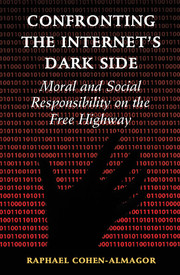Book contents
- Frontmatter
- Dedication
- Contents
- Acknowledgments
- List of Abbreviations
- Introduction
- 1 Historical Framework
- 2 Technological Framework
- 3 Theoretical Framework
- 4 Agent's Responsibility
- 5 Readers' Responsibility
- 6 Responsibility of Internet Service Providers and Web-Hosting Services, Part I: Rationale and Principles
- 7 Responsibility of Internet Service Providers and Web-Hosting Services, Part II: Applications
- 8 State Responsibility
- 9 International Responsibility
- Conclusion
- Glossary
- Selected Bibliography
- Index
7 - Responsibility of Internet Service Providers and Web-Hosting Services, Part II: Applications
Published online by Cambridge University Press: 05 July 2015
- Frontmatter
- Dedication
- Contents
- Acknowledgments
- List of Abbreviations
- Introduction
- 1 Historical Framework
- 2 Technological Framework
- 3 Theoretical Framework
- 4 Agent's Responsibility
- 5 Readers' Responsibility
- 6 Responsibility of Internet Service Providers and Web-Hosting Services, Part I: Rationale and Principles
- 7 Responsibility of Internet Service Providers and Web-Hosting Services, Part II: Applications
- 8 State Responsibility
- 9 International Responsibility
- Conclusion
- Glossary
- Selected Bibliography
- Index
Summary
The mind of the superior man is conversant with righteousness; the mind of the mean man is conversant with gain.
–Confucius
Suppose you are managing a large American Internet service provider (ISP). One day, FBI agents knock on your door and tell you that your company has been hosting a jihadi site that urged attacks against American targets. How would you feel? What would you say?
This chapter examines the implications of social responsibility for business providers and host companies that entertain problematic speech. The main question is whether ISPs and Web-hosting services (WHSs) should be proactive: that is, should they merely cooperate on receipt of information from various sources, or should they also, to promote trust among their subscribers, scrutinize their sphere for problematic, antisocial, and potentially harmful material? Many ISPs and WHSs are reluctant to do so for a very practical reason: the costs involved in employing professional staff for the task. Cynically, they might argue that morality is one thing, but here we are talking about money.
I argue that ISPs and WHSs should adopt a proactive stance in combating antisocial and violent content. They cannot be neutral toward such a phenomenon. Absolute content net neutrality constitutes clear-eyed akrasia and shedding of moral and social responsibility. The prime troubling examples that have significant presence on the Internet are crime, terrorism, child pornography, cyberbullying, and hate speech.
CRIME
One of the gravest challenges we are facing today is cybercrime – crime that is facilitated by computers or computer networks. Criminal uses of Internet communications include cybertheft, online fraud, online money laundering, cyberextortion, cyberstalking, and cybertrespass. Cybercriminals send spam, host and distribute malware, sell fake and harmful software, install backdoor Trojans (programs that perform like a real program that a user may wish to run but also perform unauthorized actions behind the scene), set up malicious websites, and design schemes to steal valuable information and money.
- Type
- Chapter
- Information
- Confronting the Internet's Dark SideMoral and Social Responsibility on the Free Highway, pp. 177 - 229Publisher: Cambridge University PressPrint publication year: 2015



